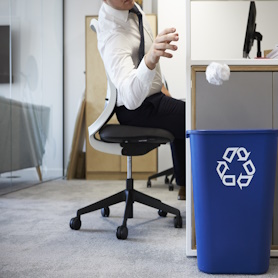
Too much sitting is harmful to mental health
If there’s one activity most of us likely were doing during the pandemic was sitting more than usual. From students spending long periods of time sitting in front of a computer when schools went to online learning to employees working from home, extra time spent sitting was a given.
How too much sitting is harmful to mental health
We are now learning the downfall of spending too much time seated. And research is backing this up. Recent studies are finding that excessive inactivity is no friend to mental health. Not only does living like a couch potato harm the physical body – expanding waistlines, increased blood pressure and diabetes – but takes a toll on mental and emotional health.
Three years ago, during the midst of the pandemic, we learned a lot about why too much time spent sitting or being physically inactive, can become the norm. A study conducted at Kent State University researched the activity patterns of almost 400 college students and teachers and whether they were more or less physically active before and after in-person classes were abruptly halted. What the researchers found was that students and faculty, who had exercised before the pandemic, had become less physically active after it began. In fact, from April to June 2020, the participants in the study sat almost eight hours more per week on average, than they had before the pandemic hit.
The negative impact of sitting too much
Another study verified what we already knew – excessive inactivity is bad for mental health. A 2020 Brazilian study of almost 950 adults found that during the pandemic, most of the study participants who spent more time at home, wound up sitting more than 10 hours a day. It also found those who increased their sitting time also reported higher symptoms of depression.
We know that spending large amounts of time being sedentary not only increases risk of bodily health issues but also messes with mental health. For children and teens, too much sitting and sedentary time can lead to more depression. Just an extra hour of sitting time for children ages 12, 14, and 16 is linked to higher depression scores by age 18, found by a study published in The Lancet.
A takeaway from the The Lancet study was that movement is good and necessary for the human body, even if it’s light activity. Breaking up long periods of time sitting with a stretch break or walking around outside for 5 minutes can vastly improve mood, stress, and thinking more clearly.
Other factors to consider if we sit too much is what other problems it can lead to such as:
- Poor circulation including adequate blood flow to the brain
- May increase inflammation by reducing the flexibility of blood vessels throughout the body
- Sleep problems such as trouble falling or staying asleep
- Unhealthy eating such as snacking on junk food
- Increased anxiety
- May reduce the brain’s ability to make new neurons resulting in thinning of brain tissue over time
- The more you sit, the more tired you tend to feel
How to avoid the harmful effects of too much sitting
The main message for all of us is to keep active each day to feel your best. Each day, make attempts to reduce sitting time to improve your health. If you find yourself sitting for more than an hour at a time, break up that cycle. Here are some ways to do that:
- Stand up to stretch
- Walk around your house or outside for at least five minutes
- Walk in place for at least a minute
- When talking on your cell phone, walk around
- Set a timer as a reminder to get up every thirty minutes to move
Dr. David Samadi is the Director of Men’s Health and Urologic Oncology at St. Francis Hospital in Long Island. He’s a renowned and highly successful board certified Urologic Oncologist Expert and Robotic Surgeon in New York City, regarded as one of the leading prostate surgeons in the U.S., with a vast expertise in prostate cancer treatment and Robotic-Assisted Laparoscopic Prostatectomy. Dr. Samadi is a medical contributor to NewsMax TV and is also the author of The Ultimate MANual, Dr. Samadi’s Guide to Men’s Health and Wellness, available online both on Amazon and Barnes & Noble. Visit Dr. Samadi’s websites at robotic oncolo gy and prostate cancer 911.
